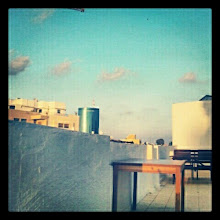10 January 2009
I feel the need to start off this post by saying that I’m physically and mentally OK. After two weeks of living through my first war living in Israel (one of many means of marking time in this country) I’m relatively sane. Even though it’s going on 2-3 hours away by car, and every day the news is nonstop coverage, normal life goes on in Jerusalem: tourists still abound, tractors still plow up the main street to make way for the light rail, bills keep appearing in my mailbox.
The center of the country where the majority of the population resides and works is referenced as “from Hadera to Gedera” after the northern and southern towns which mark the terrain. The phrase is also poignant as they are the borders of the area immune from rocket attacks from Lebanon and Gaza as the 2006 Lebanon War and the current war have proven. “The bubble” of Israel’s center is getting more and more solidified, with the only possible opening coming not fromthe influx of residents from the South, but rather the Center’s willingness to think about those other than themselves.
I wrote the following several days after the beginning of the war to illustrate what’s going on in the rest of the country:
I restarted watching live news from the Israeli network channels’ websites the other day. Not having cable and reception on my TV leaves much to be desired for my otherwise-TV addicted lifestyle, but I decided radio and news websites weren’t filling the involuntary need for information during the current war/operation/whatever in the South.
After about 20 minutes of watching the reporters in various locations and manners of field dress, the bright graphics and headlines, and listening to sentences with syllables so punctuated with emphases the spit practically came through the screen, I had to turn it off. I’ve had my fill in the past of being glued to the TV in times of crisis, from 9/11 to the 2006 Lebanon War.
I saw “Waltz with Bashir” the other night in Tel Aviv as part of my new internship. After sitting through the artistically amazing and emotionally devastating movie, I couldn’t help but have the strongest flashback to 9/12/01 at NYU. After spending the night inside and watching the news, I ventured outside to find a newspaper commemorating the attacks. Having nothing to do, as everything below 14th Street was declared a “dead zone” and no businesses were to be open, I went with a few friends to the nearby movie theater to watch whatever was playing for free. Every movie was packed; the only seats available were for “Apocalypse Now.” While it’s an incredible film with artistic importance and a moral regarding human behavior in times of crisis, it perhaps wasn’t the best choice during that period of time; this point was furthered when we got outside, introduced for the first time to the smoke from the ruins now entering the city northwards and military humvees patrolling the streets.
While leaving Dizengoff Center didn’t have the same feeling, the environment definitely felt changed. The chilled air which normally pushes pedestrians faster down the sidewalks was balanced with stopping every few meters for the latest news update beaming from a TV or radio inside a market. After ducking into an incredibly well-stocked organic market, I crossed the street for a drink with friends. If there’s one lesson I learned from 9/11 and living through a disaster, it’s to be sure to surround oneself with friends (and drink with them).
10 January 2009
Subscribe to:
Post Comments (Atom)




No comments:
Post a Comment